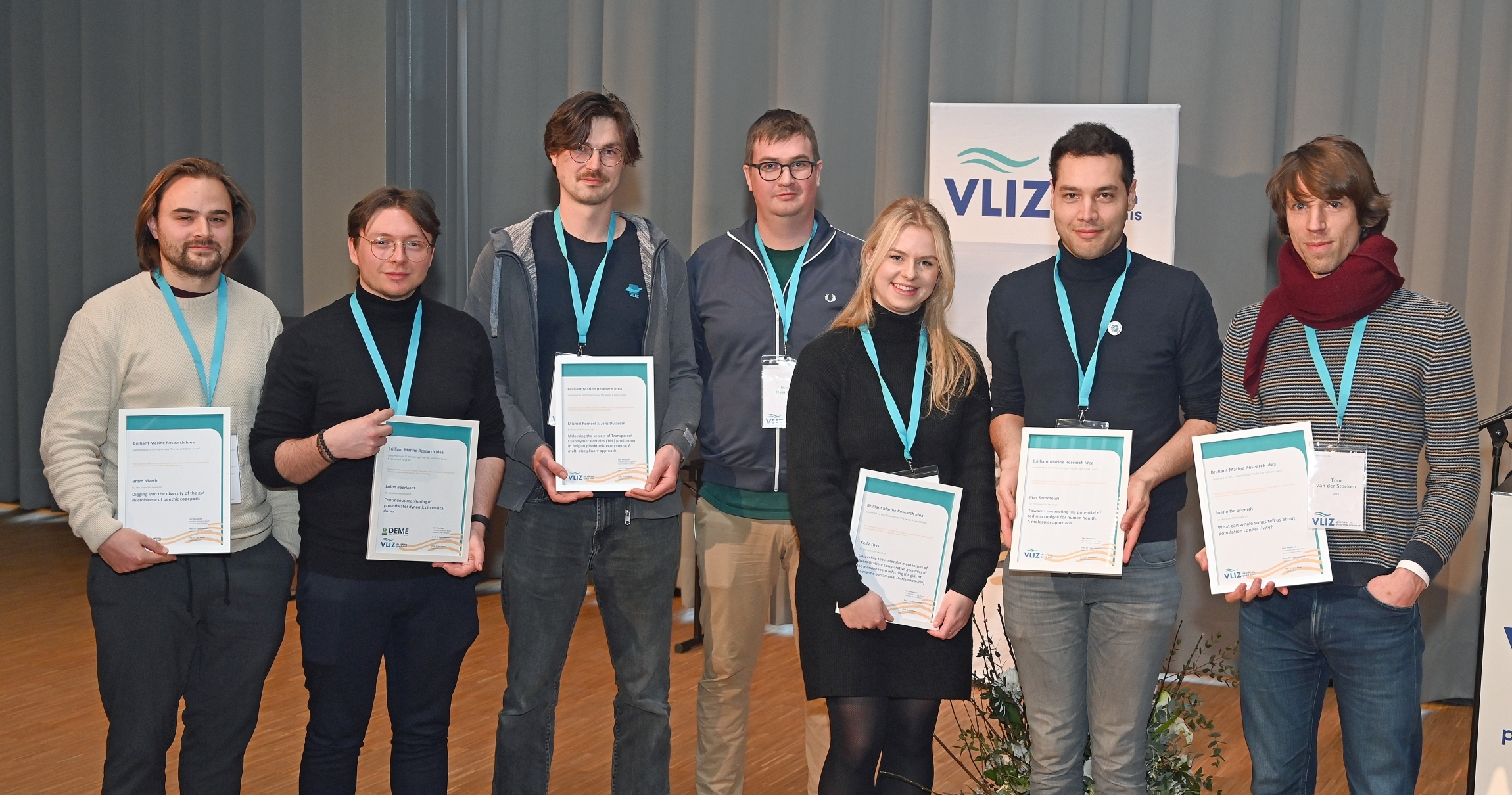28 / 04 / 2023

Photo: VLIZ | Els Verhaeghe
BMRI grants aim to inspire and support PhD students and young postdocs to further develop a 'brilliant research idea' in the context of their marine research. The BMRIs are unique in Flanders and are distinguished from other funding grants by their focus on out-of-the-box thinking. Because marine research is a field par excellence where innovation from science and industry reinforce each other, companies are given the opportunity to sponsor a BMRI grant. In this way, the company encourages young marine researchers to fully engage in original research, and endorses the importance of innovation. Between February 2023 and February 2024, the laureates carry out their BMRI research. What exactly they will do, can be read below.
Jadon Beerlandt: freshwater lenses in an artificial dune area
Jadon Beerlandt - researcher at KU Leuven - wants to investigate the development of young freshwater lenses in an artificial dune area in Raversijde. The area has multiple dynamic conditions, which are currently difficult to map. BMRI funding will be used to install a continuous ERT monitoring system. This geophysical measurement method will allow monitoring the effects of these dynamic conditions on the development of freshwater lenses, over short and long periods. The dataset will be crucial for coastal management and potential saltwater intrusion issues. This grant receives sponsorship from DEME.
Joëlle De Weerdt: endangered Central American humpback whale population
Joëlle De Weerdt – researcher at the VUB - studies the ecology of the endangered Central American humpback whale population. In her research, she determines population characteristics and abundance, as well as patterns of habitat use and migration destinations of humpback whales observed in Nicaragua. Initially, she only studied humpback whales migrating from the US. With the BMRI grant, she wants to investigate in more detail the observations of humpbacks migrating northward from Antarctica. More specifically, she wants to support the hypothesis that Nicaragua is home to not just one, but two populations of humpback whales. Whereby the migration route of the second population is along the coast. This knowledge is important to establish future management strategies.
Michiel Perneel and Jens Dujardin: Role of exopolymers in beach foaming
Have you ever been surprised by the amount of foam on the beach and wondered where it comes from? This is the result of the production of Transparent Exopolymer Particles (TEP) by the algae Phaeocystis during its spring bloom in the North Sea. The substance formed contains organic substances such as sugars and proteins, and plays an important role in transporting nutrients in the marine ecosystem. Although Phaeocystis produces TEP abundantly, the ecological relevance of the production of these particles is still unclear. Michiel Perneel and Jens Dujardin - both active at the VLIZ - are jointly using the BMRI grant to fund interdisciplinary research aimed at integrating genetic, chemical and oceanographic methods to better understand the role of TEP in the nutrient cycle of the North Sea.
Bram Martin: microbiome in the stomach of copepods
Bram Martin - PhD student at UGent - is researching the interaction between marine copepods and bacteria for his PhD. With the BMRI grant, Bram will study the microbiome, the micro-organisms present in the stomach of copepods and how this varies with food presence or absence. This study is new as far as marine benthic copepods, copepods living in sediment, are concerned. He will also investigate whether Archaea (primordial bacteria) are part of this specific gastric microbiome. For this, flow cytometry will be coupled with fluorescent in situ hybridisation, a visualisation technique in which DNA-specific probes visualise the desired Archaea cells.
Ilias Semmouri: in search of medicinal biomolecules in seaweed culture
How healthy is seaweed really? Seaweed is known to be packed with interesting nutrients, such as vitamins and healthy fatty acids. In addition, many species also contain unique biomolecules to which numerous medicinal properties are attributed: anti-tumor formation, anti-inflammatory effects, protection against harmful UV radiation, etc. Current knowledge about the conditions under which such metabolites are produced is limited. Therefore, Ilias Semmouri - postdoc at UGent - will use the BMRI grant to try to gain a first insight into the production of these substances by a molecular approach. He will map the gene expression responsible for the production of a selection of metabolites and link it to the production of biomolecules under certain cultivation methods.
Kelly Thys: Species formation in parasites and their hosts
Kelly Thys - affiliated with UHasselt - investigates the drivers of diversification and species formation in parasites and their hosts. Parasites usually diversify faster and become more species-rich than their hosts. Contrary to this expectation, the gills of African giant groupers are infected by only a single Monogenea parasite. In her research, Kelly studies the phenotypic, genetic and genomic diversity of this gill parasite in freshwater habitats. With the help of the BMRI grant, Kelly will also be able to study the genomic diversity of the closely related Indo-Pacific giant bass and their gill parasites. However, these live in saltwater habitats and the Monogenea parasites are much more species-rich. Her BMRI will thus add a marine aspect to her research, and strengthen her comparative research design.
How to obtain or sponsor a BMRI scholarship?